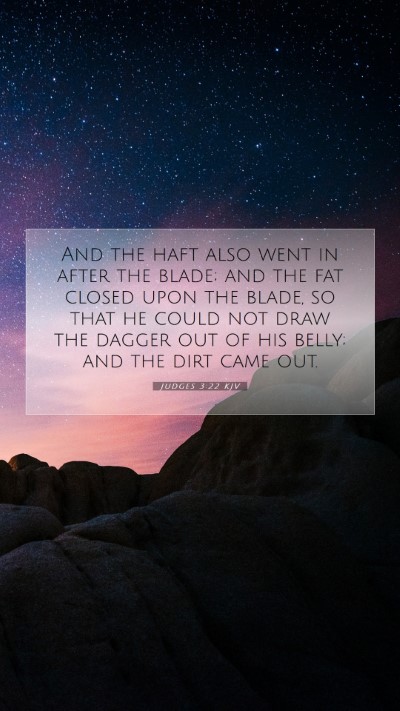Bible Verse Commentary on Judges 3:22
Judges 3:22: "And the haft also went in after the blade, and the blade went out at his back: so he died." This verse narrates an essential event in the story of Ehud, a judge of Israel, who delivers Israel from the Moabites.
Summary
This verse describes the method of Ehud’s assassination of Eglon, the Moabite king. The details underscore the extraordinary nature of Ehud's actions and reveal the significance of his role as a deliverer.
Interpretation and Analysis
The act of Ehud stabbing Eglon with the dagger, which was strategically hidden, symbolizes not only the deliverance of Israel but also the judgment upon Israel’s oppressor. The commentary by Adam Clarke emphasizes the meticulous planning and covert execution of Ehud's mission, illustrating how God used Ehud as an instrument of His divine justice.
- Matthew Henry: Henry notes that the description of Eglon's fatness is significant, suggesting his indulgence and the weaknesses of those who oppress God's people. The ease with which Ehud can attack reflects Both Eglon's false security and God’s active participation in liberating Israel.
- Albert Barnes: Barnes discusses the implications of this event in the broader context of Israelite history, emphasizing the cyclical nature of Israel's sin, oppression, repentance, and deliverance. He points out that this event illustrates how God raises leaders in times of need, affirming His providence and sovereignty.
- Adam Clarke: Clarke elaborates on the symbolism presented in the verse, interpreting Eglon’s death as a metaphor for the defeat of sin and oppression. He highlights the poetic justice involved in the manner of Eglon's death, which reflects the moral and spiritual life of the people of Israel at the time.
Spiritual Lessons
This verse teaches the importance of courage and divine guidance in the face of oppression. Ehud, though one man against a king, acts through the empowerment of God’s spirit. This emphasizes the idea that God can work through individuals who are obedient and willing to carry out His will.
Historical Context
The Book of Judges depicts a time in Israel's history characterized by a lack of centralized leadership and frequent cycles of disobedience and repentance. Ehud's story occurs during Israel's subjugation by the Moabites, a historical context that heightens the significance of divine intervention through judges.
Cross References
- Judges 3:15 - God raises Ehud to deliver the Israelites from Moabite oppression.
- Judges 4:1-3 - Another cycle of oppression and the rise of Deborah as a judge.
- 1 Samuel 15:33 - The theme of judgment upon rulers for their sins parallels Eglon's fate.
Application of the Verse
This verse encourages readers to reflect on their own lives regarding the courage to confront challenges. Just as Ehud took action to deliver the Israelites, individuals today are called to stand firm against injustice and seek divine guidance in their endeavors.
Conclusion
The narrative of Ehud and Eglon in Judges 3:22 illustrates the sovereignty of God in using human agents to fulfill His purposes. The account serves as a reminder of the importance of faithfulness, courage, and God's unwavering support in times of need. Such accounts provide profound Bible verse meanings and Bible verse understanding that resonate through generations.


